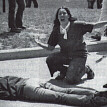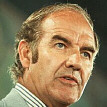I. Counterculture difficult to define succinctly
A. Unorganized & varied attack by young people
1. Against "the Establishment"
2. "Don't trust anyone over 30"
3. "Do your own thing"
B. Challenged traditional American cultural values
1. Attitudes toward sexual experience
2. Experimentation w/ mind-altering drugs
3. Rejection of materialism & conformity
• communal living (Haight-Ashbury in San Fran)
• long hair, shabby clothing, loose speech
C. America's youth were making history by accident
1. Disgusted by dishonesty of politicians
2. Horrified by brutality of Vietnam
3. Appalled by American racism
4. Contemptuous of political & social smugness
D. Several parallels to Progressive Era
II. John F. Kennedy = "King Arthur & James Bond combo"
A. Election of 1960
1. Televised debates erased Nixon's fine résumé
• JFK = eye candy; Nixon = face for radio
• viewers liked JFK; listeners preferred Nixon
2. Closest since 1888 (120,000 of 68 million votes)
B. JFK: moderate, energetic, popular, overrated
1. Youngest elected (43) & 1st Catholic
2. "...ask not what your country can do for you...."
3. PT-109 episode & Profiles in Courage overstated
C. "New Frontier" experienced modest progress
1. Health & medical-care program for elderly
2. $5 billion/5 yrs to education (schools & salaries)
3. Progressive tax reduction to stimulate economy
4. More rapid integration in the South
D. Foreign Affairs
1. Non-military aid to developing countries
• Alliance for Progress = $ & tech to Latin Amer.
• Peace Corps = workers to Third World nations
2. Space race
• Yuri Gagarin (1961) vs. John Glenn (1962)
• Apollo project = manned lunar landing in 10 yrs
3. Cold War
• Bay of Pigs (1961) & Cuban Missile Crisis (1962)
• Limited Nuclear Test Ban Treaty (1963)
• McNamara's policy of "flexible response"
• Berlin Wall confrontation (1963)
• pledged to protect South Vietnam
E. Reform by Supreme Court under Earl Warren
1. Mapp v. Ohio (1961) → illegally seized evidence
2. Engel v. Vitale (1962) → no precise school prayer
3. Gideon v. Wainwright (1963) → legal counsel
4. Miranda v. Arizona (1966) → rights of arrested
F. Assassinated in Dallas (1963)
1. Warren Commission: Lee Harvey Oswald alone
2. Conspiracy theories common (none w/o holes)
III. Lyndon B. Johnson = "Texas-size SOB w/ 10-gal. heart"
A. LBJ: generous, loyal, egocentric, crafty, crude
B. Defeated Barry Goldwater (Ariz) handily
C. Inaugural Address uncharacteristically restrained
D. "Great Society" aided by tidal wave of JFK emotion
1. Greatest legislative output since FDR's New Deal
• aggressive attack on civil rights
• health coverage for elderly & indigent
• promotion of economic opportunity
• created Dep't of HUD (headed by Robt. Weaver)
• $ to education based on student, not school
• immigration ceiling w/o "nat'l origins" quota
• development of high-speed railroad
• anti-pollution, inc. beautification of America
• more, more, more
2. Results
• huge increase in gov't spending
• markedly reduced % below poverty line
• gov't programs to solve social problems = ?
3. Foiled by Vietnam War; halted by Republicans
IV. 1968
A. Vietnam War
1. Tet Offensive (Jan)
• Viet Cong eventually repelled w/ huge losses
• American public's "light bulb" event
• Gen. Wm. Westmoreland replaced
2. My Lai massacre (Mar)
• 500 villagers / Lt. Wm. Calley & Capt. E. Medina
• W.O. Hugh Thompson, Jr. & helicopter buddies
• increased # of conscientious objectors (later)
• fueled American peace movement (later)
B. Assassinations
1. Martin Luther King, Jr. at Memphis motel (Apr)
2. Robert Kennedy in LA hotel kitchen (June)
C. Summer Olympics (Oct)
1. Tommie Smith & John Carlos
2. "Black Power" salute
D. Presidential election (Nov)
1. LBJ politically deflated by Vietnam fiasco
2. Stormy Democratic Convention in Chicago
3. V-P Humphrey (D) vs. Nixon (R) vs. Wallace (I)
V. Woodstock Music & Art Fair = "Counterculture Convention"
A. Bethel, New York (Aug 15-17, 1969)
1. Originally intended for nearby Woodstock
2. Max Yasgur's 600-acre dairy farm
3. $7 per day or $18 for all 3 days ($100 today)
B. 27 total acts = virtual Who's Who of rock 'n' roll
1. Biggest: CCR, Jefferson Airplane, Hendrix, The Who
2. Most memorable performances
• Jimi Hendrix → "The Star-Spangled Banner"
• Country Joe → "cheer" & anti-war "rag"
• John Sebastian → "forgetful" impromptu show
• The Who → guitar-smashing finale
• CSN&Y → "Woodstock" anthem after concert
3. Others → Cocker, Joplin, Santana, Ten Years After
4. Ah, shucks → Beatles, Doors, Rolling Stones
5. Oops → Dylan, Iron Butterfly, Led Zeppelin
C. Nearly ½ million hippies exceeded plans & facilities
1. Chaos = drug trip, sex orgy, mud bath, traffic jam
2. Free concert + law suits = $1.8 million loss
3. 2 deaths (overdose & accident) + 3 births = +1 net
D. Aftermath
1. Several drug deaths (Hendrix, Joplin, et al.)
2. 6-ft monument w/ performers & dove-on-guitar logo
3. Numerous performers in Rock & Roll Hall of Fame
4. 25-yr anniversary concerts = 2 attempts, 2 flops
|

& HISTORY

|
|
|
VI. Richard Nixon = "Wicked Witch of the West"
A. Nixon: calculated, rehearsed, stiff, unprincipled
B. Foreign affairs
1. Kissinger = Nat'l Security Adviser & Sec. of State
2. Vietnam War
• Vietnamization strategy
• Vietnam Moratorium Day = Oct 15, 1969
• Kent State tragedy ('70)
✓ revelation of Cambodian "incursion"
✓ 4 students eulogized in "Ohio" by CSN&Y
• publication of "Pentagon Papers" (1971)
• Paris Agreement = "peace w/ honor" (1973)
3. Cold War
• "détente" = relaxing of tension
• Strategic Arms Limitation Treaty (aka SALT I)
• 1972 summits w/ China & Soviet Union
C. Domestic issues
1. Wage & price controls to fight inflation (1971)
2. Supreme Court nominations rejected
3. Arab oil crisis (1973)
• 55-mph speed limit
• Alaskan pipeline
4. Watergate scandal
• break-in of Dem. headquarters by CREEP
• Wash Post; Oval Office tapes; testimonies
• 40+ individuals involved
• resignation to avoid certain impeachment
5. Troubles w/ V-P Spiro Agnew
• unrelated to Watergate incident
• replaced by Gerald Ford (Mich)
VII. Election of 1972
A. Incumbent Richard Nixon
1. Watergate break-in not a factor
2. Misleading "peace is at hand" strategy
B. Challenger George McGovern (S Dak)
1. Liberal "peace candidate" alienated work class
• immediate withdrawal from Vietnam
• end of draft & amnesty for draft-dodgers
• decrease of U.S. military forces in Europe
• bussing to achieve school integration
• nat'l health insurance program
2. Twenty-sixth Amendment vote
3. Troubles w/ V-P mate Thomas Eagleton (Mizzou)
• intensive psychotherapy years earlier
• Kennedy, Muskie, Humphrey, Ribicoff decline
• settles on R. Sargent Shriver (limited résumé)
• doomed already dim campaign
C. Big win for Nixon; McGovern only 17 electoral votes
VIII. Minority Movements
A. New Feminism
1. 1920 thru 1960 = plateau years
2. Reform objectives
• end of sex-segregation in clubs, jobs, etc.
• no beauty contests & ads as "sex symbols"
• end of cultural stereotype as wives & mothers
• gov't child care centers for working women
• change in semantics (e.g., "Ms." & "he/she")
• absolute & full legal equality w/ males
3. Betty Frieden
• children & home = "sense of emptiness"
• The Feminine Mystique (1963)
• National Organization for Women (1966)
4. Changes in society
• mini-skirt introduced (1965)
• Yale, Princeton, others admitted women (1969)
• Ms. magazine by Gloria Steinem (1972)
5. Gov't action
• Equal Pay Act (1963)
• Title IX by Patsy Mink (1972)
• Equal Rights Amendment failed 35/38 (1972)
• Roe v. Wade (1973)
6. Opposition, inc. female
• Phyllis Schlafly, esp. ERA
• religious fundamentalists, esp. Roe v. Wade
7. Milestones
• Nancy Landon Kassebaum → Senate (1978)
• Sandra Day O'Connor → Supreme Court (1981)
• Geraldine Ferraro → V-P candidate (1984)
• Nebraska gubernatorial election (1986)
B. Civil Rights movement
1. Important prior events
• Plessy v. Ferguson (1896) = "separate, equal"
• NAACP by Wm. E. B. Du Bois, et al. (1909)
• Harlem Renaissance (1920s)
• Jackie Robinson w/ Brooklyn Dodgers (1947)
2. Brown v. Board of Educ. (1954) = event of origin
3. Martin Luther King, Jr. advocated peaceful action
4. Black militancy
• Black Muslims (Elijah Muhammed, Malcolm X)
• Black Panthers (Bobby Seale, Huey Newton)
5. Race riots
• Watts district of Los Angeles (1965)
• Kerner Commission report
C. Gay Liberation movement
1. June 27, 1969 = date of origin
2. "Stonewall Riot" in NYC's Greenwich Village
|





